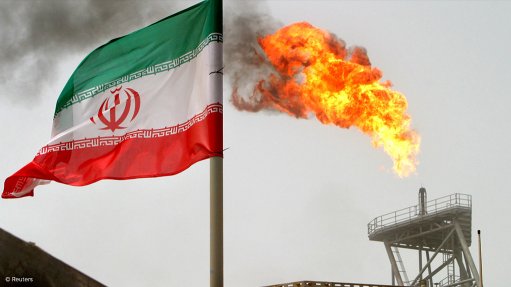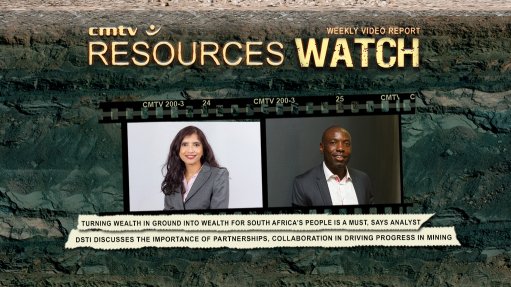Wanblad calls on African govts to be more fair-minded in mining risk/reward balance
In a mining era that requires collaboration and partnerships between the public and private sectors, Anglo American CEO Duncan Wanblad has called on African governments to adopt a more fair-minded approach to sharing both revenue and risk in mining development projects.
“Governments need assurances that they will benefit appropriately from the rich land resources of their own countries, while businesses need the confidence that their mining licences and returns will be secure for the expected time horizon. Future-proofing African mining means collaborating like never before to make it happen,” he said at the Investing in African Mining Indaba, in Cape Town, on February 3.
Wanblad highlighted the importance of integrated industrial strategies and trade partnerships – such as the African Continental Free Trade Area Agreement or the African Growth and Opportunity Act – as powerful mechanisms to unlock the competitiveness of the continent.
“These are vital frameworks for enhancing market access, reducing regulatory uncertainty and driving industrialisation,” he said.
Addressing global trends, Wanblad pointed out that a growing global population, projected to reach ten-billion by 2080, would drive demand for improved living standards, food security and sustainable infrastructure.
He emphasised Africa's role, noting that the continent had a central role to play – not just as a supplier of resources, but also as a potential driver of the future global economy.
“The power of interconnected value chains across Africa and the rest of the world cannot be overstated. When we think beyond individual mines and individual countries, we see enormous multiplier effects,” Wanblad said.
However, to manage these complexities, he advocated for “… bold partnerships, innovative funding models and a commitment to reducing red tape”.
Wanblad called on governments to create more conducive environments for investment by streamlining regulatory processes, providing policy certainty and unlocking investment in critical infrastructure, particularly rail, ports and water.
“As for the private sector, we must not only invest, but also act as partners in development,” he added.
Discussing resource nationalism, Wanblad acknowledged its importance.
“Resource nationalism is a crucial consideration here. African leaders are rightly advocating for more significant equitable participation in the mining value chain. This presents an opportunity to create jobs, develop industries and ensure that the benefits of mining are experienced locally,” he said.
Turning his focus to South Africa, Wanblad expressed optimism, saying he was hopeful for the domestic mining industry, given several recent positive developments.
He cited the Government of National Unity and public-private partnerships such as Business for South Africa as examples of successful collaborations.
“[These] demonstrate what can be achieved when we focus on addressing shared challenges.
“In the last year, the country has experienced a vast improvement in energy supply. We have also seen wait-times at ports showing some improvement,” he stated.
He also highlighted the Network Statement published by State-owned Transnet and the establishment of the Public Sector Participation Unit as critical steps towards enhancing rail performance.
“Furthermore, the improving capability for commercial crime prosecution and establishing the National Water Infrastructure Agency are additional signs that reforms aimed at addressing pressing challenges are now taking hold,” he added.
Wanblad pointed to the rand's performance and increased fixed investment projects as indicators of growing confidence in South Africa’s reforms.
“The rand's performance among emerging market currencies for 2024 is not merely a statistic – it shows growing confidence in the country’s reforms. The increase in fixed investment projects from 2023 to 2024 represents real capital, creating real opportunities. We’re pleased to see the likes of S&P revising South Africa’s outlook to 'positive',” he said.
Despite these positive developments, Wanblad acknowledged that there remained several ongoing challenges.
“This progress is encouraging! However, not everything is so rosy. There’s still a lot of heavy lifting to do on critical challenges,” he noted.
Wanblad pointed out that what was happening in South Africa also exemplified the opportunities and challenges experienced across the rest of Africa.
“To future-proof African mining, we must look beyond any singular country or moment in time and, instead, ask more broadly how it could sustain continental growth for many generations to come,” he said.
Wanblad also addressed the growing demand for critical minerals owing to global decarbonisation, economic development and population growth.
“As the world decarbonises, economies develop and populations grow, the demand for critical minerals will only increase. Africa is home to some of the largest deposits of these minerals, positioning the continent as a leading enabler.
“But this will only transpire if the deposits can be developed and brought to market, which in turn requires stable regulatory and fiscal environments in which to invest,” he said.
However, he cited infrastructure constraints and resource protectionism as points of significant concern.
“The reality is, we're leaving billions of dollars in mineral value untapped because of infrastructure constraints. [Further], the race for critical minerals has sparked resource protectionism among major powers and we are seeing countries impose tariffs and export bans on critical materials to protect their own industrial sectors,” Wanblad said, noting that this was not merely a case of typical country-on-country tensions, but something new.
“Western democracies are forming new alliances and financing networks that are designed to direct capital towards critical minerals projects to strengthen their position in the global economy.
“We're seeing governments accuse each other of weaponising trade and industry under the guise of national security. These geopolitical tensions have fuelled a rise in State interventions and protectionism in Western democracies not seen in most of our lifetimes,” he remarked.
However, he said Africa held a key strategic position.
“Africa's abundance in critical minerals positions it to be more than just another supplier in global value chains, and so nations must become comfortable as strategic partners.
“But African governments, as is the case anywhere else in the world, also need to provide fiscal and regulatory stability, aided by the rule of law, in order to attract investment,” Wanblad said.
Article Enquiry
Email Article
Save Article
Feedback
To advertise email advertising@creamermedia.co.za or click here
Press Office
Announcements
What's On
Subscribe to improve your user experience...
Option 1 (equivalent of R125 a month):
Receive a weekly copy of Creamer Media's Engineering News & Mining Weekly magazine
(print copy for those in South Africa and e-magazine for those outside of South Africa)
Receive daily email newsletters
Access to full search results
Access archive of magazine back copies
Access to Projects in Progress
Access to ONE Research Report of your choice in PDF format
Option 2 (equivalent of R375 a month):
All benefits from Option 1
PLUS
Access to Creamer Media's Research Channel Africa for ALL Research Reports, in PDF format, on various industrial and mining sectors
including Electricity; Water; Energy Transition; Hydrogen; Roads, Rail and Ports; Coal; Gold; Platinum; Battery Metals; etc.
Already a subscriber?
Forgotten your password?
Receive weekly copy of Creamer Media's Engineering News & Mining Weekly magazine (print copy for those in South Africa and e-magazine for those outside of South Africa)
➕
Recieve daily email newsletters
➕
Access to full search results
➕
Access archive of magazine back copies
➕
Access to Projects in Progress
➕
Access to ONE Research Report of your choice in PDF format
RESEARCH CHANNEL AFRICA
R4500 (equivalent of R375 a month)
SUBSCRIBEAll benefits from Option 1
➕
Access to Creamer Media's Research Channel Africa for ALL Research Reports on various industrial and mining sectors, in PDF format, including on:
Electricity
➕
Water
➕
Energy Transition
➕
Hydrogen
➕
Roads, Rail and Ports
➕
Coal
➕
Gold
➕
Platinum
➕
Battery Metals
➕
etc.
Receive all benefits from Option 1 or Option 2 delivered to numerous people at your company
➕
Multiple User names and Passwords for simultaneous log-ins
➕
Intranet integration access to all in your organisation




















